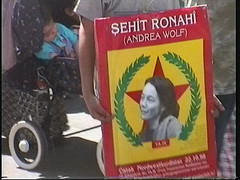kino21's fall series, How We Fight, presents
international works that explore soldiering and depict the experience of war
from the point of view of those on the ground. From Argentina, Russia,
Iraq, Germany, France, Holland and the U.S., several of these films are US
premieres.
The series began on September 25 with Iraqi Short Films, a brand
new compilation of videos shot in battle by soldiers and militia members in
Iraq. Subsequent programs include video diaries of the battlefield and pre-
or post-combat rumination, extended observational portraits and
interview-based works. There are depictions of Russian conscripts in
Chechnya, PKK rebels in the mountains of Iraq, American veterans returned
from Vietnam, and mercenaries and peacekeepers stationed across the globe,
from Bosnia to Rwanda, from the Middle East to the USA.


PLEASE NOTE: THESE FILMS ARE NOT PROPAGANDA FILMS. THEY ARE CRITICAL EXPLORATIONS AND DO NOT ENDORSE VIOLENCE OF ANY KIND.
This third program in the How We Fight series consists of two works that portray those fighters who operate outside the sanctions of society's structures for armed conflict. Stefano Savona's Notes of a Kurdish Rebel follows a group of young, idealistic fighters in the mountains of Northern Iraq as they prepare to cross into Turkey. Hito Steyerl's November is a thought-provoking essay on the role of the image of revolutionary gesture as embodied by her friend Andrea Wolf. Both films are complex depictions of the desire to take up arms, and both suggest the central role of women as fighters in the Kurdish struggle.
Steyerl's essay is part portrait of Andrea Wolf (aka Sehit Rohani), who became a Kurdish/German icon after her death during a military operation, and part interrogation of the nature of the pose, the role of traveling images, and the imbrication of cinematic fiction and reality in revolutionary iconography. It is also a reflection on the place of revolution today. As she says in her voice-over, we're no longer part of the period described by Eisenstein's October. "November is the time after October, a time when revolution seems to be over and peripheral struggles have become particular, localist and almost impossible to communicate. In November a new reactionary form of terror has taken over . . ."
Savona's film provides an intimate and illuminating look at the world of foot soldiers in the fight for Kurdish recognition from the Turkish state. Focusing primarily on a small group of five fighters, two of whom grew up in Germany, Notes gentle eye and calm pace reveals the rebels' passionate commitment (typically the result of family history) and occasional disillusionment. Alternating the diary entries of the translator/fighter Akif with conversations and observational sequences, the film also presents a fascinating look at Sehit Harun an area ruled by women fighters where men only enter if they "accept to have their masculinity 'reeducated'. "

How We Fight: Conscripts, Mercenaries, Terrorists and Peacekeepers is presented with the generous support of the Potrero Nuevo Fund of the Tides Foundation, the LEF Foundation, and Goethe Institut San Francisco.